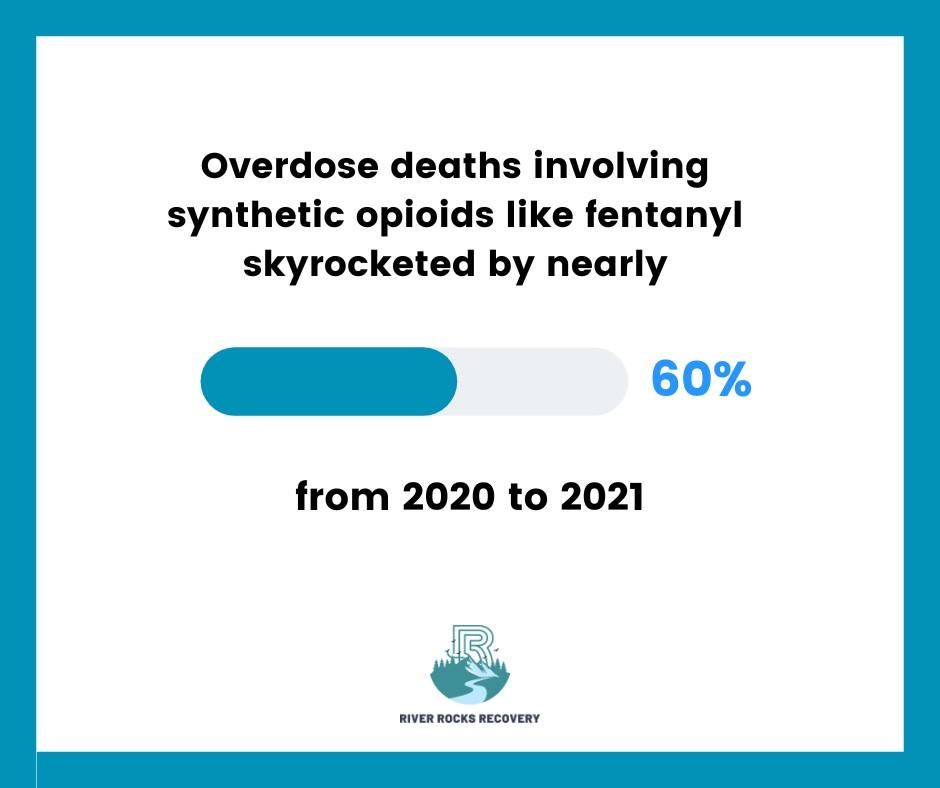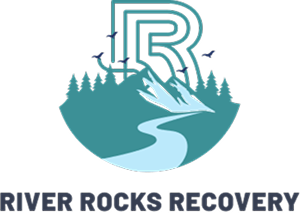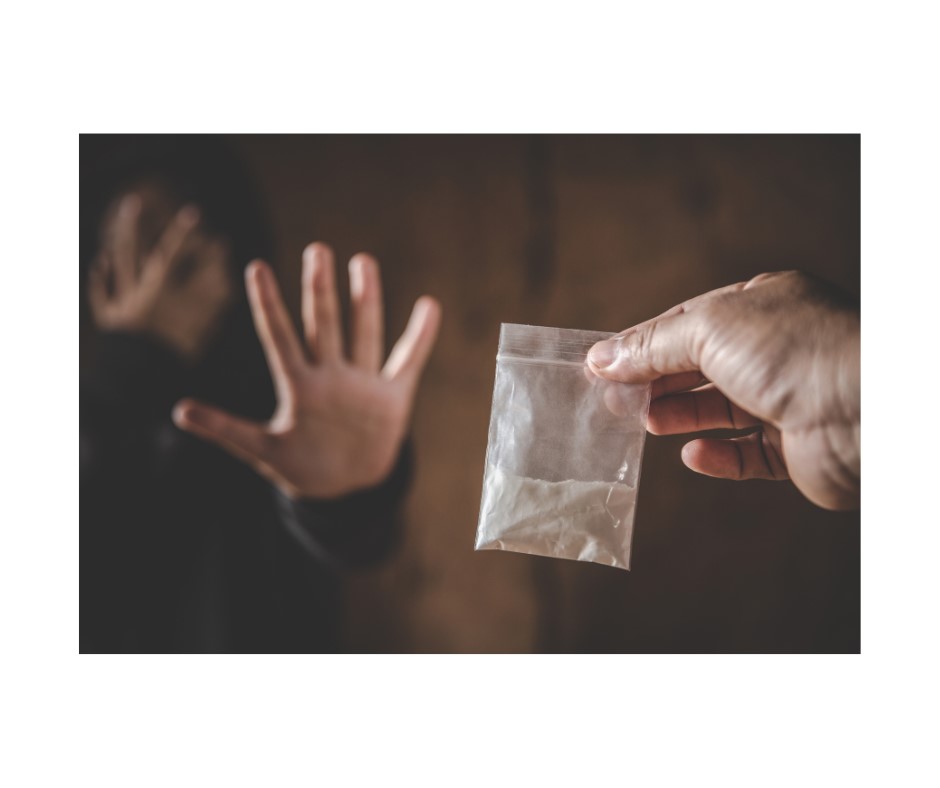You never wake up one day and decide that today is the day you become an addict. Addiction creeps up slowly, taking hold before you even realize you have a problem. In 2024, addiction remains a critical issue facing our society. Understanding the most deadly and dangerous drugs, as well as the latest statistics on addiction, is the first step to getting help. At River Rocks Recovery in Middletown, Ohio, we provide comprehensive treatment programs and therapy services to start you on the road to recovery. Our partial hospitalization program, intensive outpatient program, outpatient services, and therapy modalities like CBT and DBT empower you to break free from addiction’s deadly grasp. With customized treatment plans and compassionate support, we can help you reclaim your life. Reach out today at (888) 905-6281 and turn over a new stone today.
The Most Dangerous Drug in 2024
Although there are many deadly drugs, lately one seems more prominent among them all. Fentanyl, a powerful synthetic opioid, stands out as the most deadly and dangerous drug in 2024. Its potency—up to 100 times stronger than morphine—coupled with its widespread availability, makes it a lethal threat.
What Are the Worst Drugs?
Opioids – The Deadliest Substance
Opioids like heroin, fentanyl, and prescription painkillers remain the most dangerous and deadly drugs. According to the CDC, over 107,000 overdose deaths occurred in 2021 – with opioids involved in nearly 75% of those fatalities. Their high addiction potential and respiratory depression effects make opioids an unrivaled threat.
Stimulants – Cocaine and Methamphetamine
Highly addictive stimulants cocaine and methamphetamine rank among the worst drugs. These powerfully euphoric substances inflict severe cardiovascular and neurological damage. Overdoses are common due to their effects on the brain’s dopamine system. Addiction therapy is recommended for anyone struggling with such substances.
Alcohol – The Most Socially Accepted Vice
Alcohol may seem benign, but it remains one of the most harmful and addictive substances. Excessive drinking leads to organ failure, violent behavior, and a tragically high number of DUI fatalities each year. Its legality belies its true danger.

Alarming Statistics
According to the CDC, overdose deaths involving synthetic opioids like fentanyl skyrocketed by nearly 60% from 2020 to 2021. This alarming trend shows no signs of slowing, making fentanyl addiction a pervasive public health crisis.
Finding Treatment for Fentanyl, Alcohol, and Drug Addiction
River Rocks Recovery offers comprehensive treatment for fentanyl addiction. Our evidence-based programs include a partial hospitalization program (PHP), intensive outpatient program (IOP), and outpatient therapy.
Proven Therapeutic Approaches
We utilize cognitive-behavioral therapy (CBT), dialectical behavior therapy (DBT), individual and group counseling. This multi-pronged approach empowers you to overcome fentanyl’s powerful grip.
Partial Hospitalization Program (PHP)
Intensive Recovery Support
The partial hospitalization program (PHP) offers intensive, structured treatment. It provides a full schedule of evidence-based therapies and counseling sessions. Clients receive around-the-clock support and supervision during the day.
Transitional Step
PHP serves as a step-down level of care after residential treatment. Or it can prevent the need for inpatient hospitalization. The program equips clients with coping skills before transitioning to outpatient care.
Intensive Outpatient Program (IOP)
Structured Support
River Rocks Recovery’s intensive outpatient program (IOP) provides structured support for those battling addiction. This level of care offers comprehensive services without full-time inpatient treatment.
Flexible Scheduling
IOP allows for a flexible schedule to accommodate work or school commitments. Treatment consists of several hours of therapy per week on an outpatient basis.
Outpatient Program
Your journey towards lasting recovery continues with our outpatient program. This step-down level of care follows our intensive outpatient program (IOP), further solidifying the coping skills and relapse prevention techniques learned.
Flexible Scheduling
Our outpatient program offers flexible day and evening sessions to accommodate your work or personal schedule. Sessions meet just 1-2 times per week for several months.
Cognitive-Behavioral Therapy (CBT)
Addressing Negative Thoughts
Cognitive-behavioral therapy (CBT) is an evidence-based psychotherapy that helps identify and change inaccurate or negative thinking patterns. These distorted thoughts can provoke undesirable behaviors and emotional distress.
Practical Strategies
Through CBT, clients learn coping strategies to reframe negative thoughts into more positive mindsets. This practical approach equips them to better handle stressful situations without resorting to substance abuse.
Dialectical Behavior Therapy (DBT)
Dialectical behavior therapy (DBT) is a type of psychotherapy. It helps patients regulate intense emotions through mindfulness and acceptance.
Key Principles
DBT combines cognitive-behavioral techniques with concepts from Buddhism. Key aspects include:
- Being mindful and present in the current moment
- Developing healthy ways to cope with stress
- Learning to regulate emotions
- Improving relationships with others
Benefits for Recovery
DBT can be very beneficial for those recovering from addiction. It teaches crucial skills like:
- Tolerating and managing cravings
- Identifying addiction triggers
- Building a support system
- Improving impulse control
With consistent practice, DBT empowers individuals to break free from substance abuse.
Individual Counseling
One-on-One Support
In individual counseling sessions, clients work closely with a licensed therapist. This personalized approach explores the root causes fueling addiction – providing tools for lasting recovery.
Customized Care
Therapists tailor treatment plans based on each person’s unique background and needs. Through cognitive-behavioral therapy (CBT), dialectical behavior therapy (DBT), and other evidence-based methods, clients develop healthy coping mechanisms.
Privacy & Comfort
The confidential setting fosters open, honest discussions in a safe space. Clients gain self-awareness, process trauma, and set achievable goals – all at their own pace.
Group Therapy
Shared Struggles, Collective Healing
Group therapy offers a powerful avenue for individuals battling addiction. In these sessions, participants share their experiences, fears, and triumphs – fostering a profound sense of connection and mutual understanding.
Safety in Numbers
The group setting provides a safe, judgment-free space where vulnerabilities can be openly explored. Members draw strength from one another, realizing they are not alone in this arduous journey.
Diverse Perspectives
With varied backgrounds and stories, group members gain invaluable insights into different coping mechanisms and strategies. This diversity enriches the recovery process, offering a multitude of approaches to overcome challenges.
Conclusion
As we have seen, addiction remains a challenging problem in 2024. Every drug and each drink comes with great risk and dangers. With opioid overdoses tragically still rising and new dangerous synthetic drugs emerging each year, it is clear that we still have work to do. The compassionate programs at River Rocks Recovery provide evidence-based care, including partial hospitalization, intensive outpatient treatment, individual and group counseling, cognitive behavioral therapy, and dialectical behavior therapy. By leveraging these treatments and the support of peers and clinicians, you or your loved one can find the path to lifelong recovery. There are always reasons for hope, no matter how difficult the journey. Reach out today at (888) 905-6281 to learn more.
FAQs Most Deadly and Dangerous Drug
Q. What is the most deadly drug?
Fentanyl, a powerful synthetic opioid, is considered the most deadly and dangerous drug today. Its potency makes it highly addictive and potentially fatal, even in tiny doses.
Q. What addiction therapies does River Rocks Recovery offer?
We provide evidence-based therapies like cognitive-behavioral therapy (CBT), dialectical behavior therapy (DBT), individual and group counseling. Our programs include a partial hospitalization program (PHP), intensive outpatient (IOP), and outpatient treatment.
Q. How effective are these therapies?
CBT, DBT and group therapy demonstrate high success rates in treating addiction by changing harmful thoughts and behaviors. Our comprehensive, tailored approach maximizes recovery outcomes.

